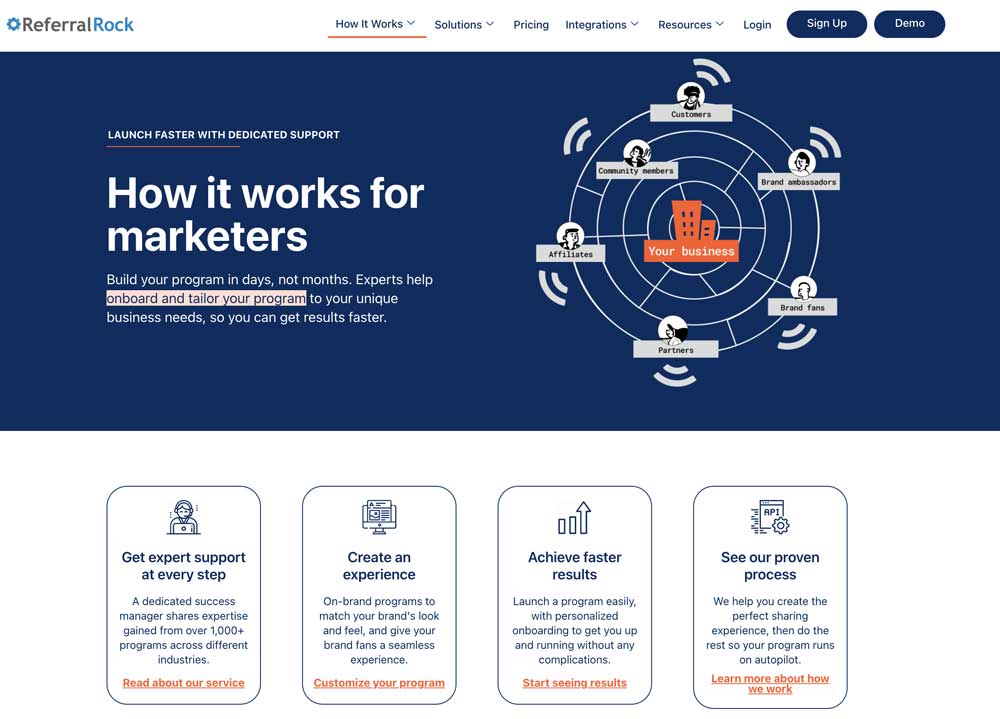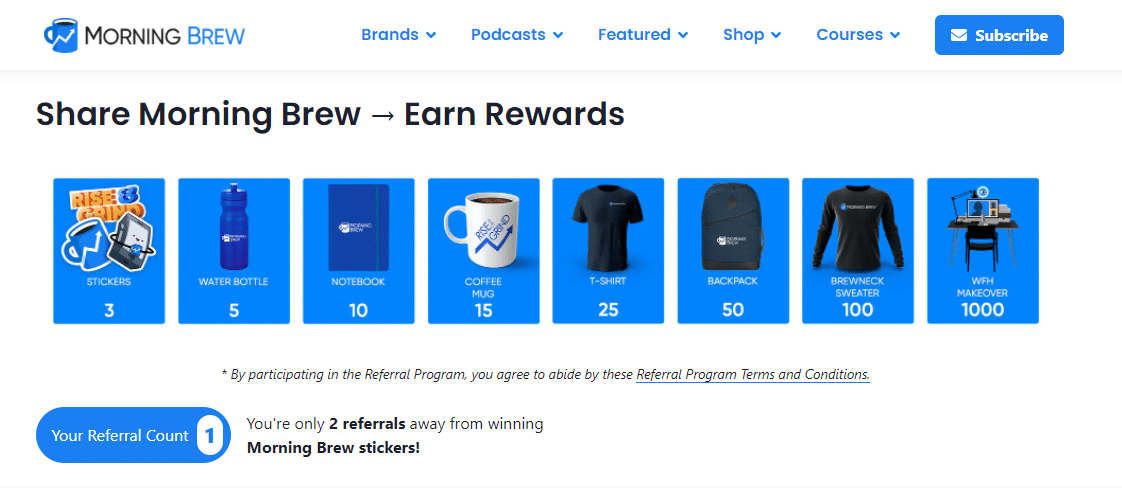A well-built referral network is an extremely powerful tool for companies to foster business growth. After all, referrals are not just a way of getting your foot in the door with prospective customers – they provide a system to follow up with leads and motivate purchases.
When network members – employees, customers, or partners – make referrals, they are vouching for your company. This vouching creates a sense of trust that can lead to more sales and conversions.
With such a network, you can consistently attract high-quality leads into your system. And when done right, you can even take advantage of a viral sharing component, where referred customers join the network and reliably refer their own peers (continuing a repeatable sharing cycle).
Clearly, building a powerful referral network is key for business owners looking to grow their brand. But what exactly is a referral network, and how can you build a strong, effective one?
Today, we’ll cover how this marketing model works and offer tips for setting up your own successful referral network.
What is a referral network?
A referral network is a group of referral sources, or people who will constantly refer your company to interested leads. It can be made up of individual customers, business customers, business professionals, employees, or formalized referral partners. The goal of a referral network is to bring in new business by encouraging the people in the network to share your brand and products with their friends and colleagues. Essentially, the network members become your personal “influencers.”
Usually, a business referral network involves motivating the parties in the network using some sort of reward or incentive. For example, if an employee refers someone to your company, and that person ends up becoming a new client, you might give the referring employee a gift card, tech item, cash payout, or other perk.
Types of referral network
If you’re looking for an excellent way to grow your business, you might want to consider a referral network. You can structure your network in the way that works best for you, whether that’s through a formal arrangement, such as a contracted referral partnership, or more informally, such as a customer referral program. Below are four main types of referral networks:
1. Customer referral network
A customer referral network is a group of customers who have signed up to recommend your business. They share your business with interested family and friends, and earn incentives for doing so. This arrangement is informal, as customers can refer friends to your business as often as they want. But they’re usually motivated to refer more customers to earn more rewards.
There are several different ways that your business can incentivize customers to make referrals:
- Tangible rewards, such as free products or branded swag.
- Discounts
- Cash back
- Store credits that accumulate over time and that can be used towards future purchases.
- Drawing entries: Every referral earns a discount or credits, but also earns an entry into a drawing for a bigger prize.
2. Employee referral network
While most companies encourage employee referrals to some degree, many are not tapping into the full potential of these recommendations or incentivizing employees for bringing in new customers.
Your business can go a step further by creating an employee referral network – a system where your employees consistently share their business with people in their circles.
Reliable employee referral networks make the sharing process more official and offer rewards for employees who make referrals. While employees are free to refer your business as often as they desire, they’re encouraged to do so more often thanks to these incentives.
Rewards could be cash, gift cards to brands employees enjoy, career development opportunities such as paid conference costs, or experiential rewards such as sporting event or concert tickets. By rewarding employees when their recommendations result in sales, businesses can tap into a powerful marketing channel.
3. Referral partner network
Referral partner networks are made up of businesses, customers, or industry professionals who sign a formal agreement to refer your company to interested leads.
They refer your business to people or companies they already have connections with, and in exchange, they earn cash commissions on every successful referral.
Often, referral partners are also motivated to share because this builds goodwill with their clients or connections. By referring peers to businesses they know and trust, and that they believe their peers can benefit from, the referral partners themselves earn more trust from their peers.
Non-competing businesses make great potential referral sources. For instance, if you’re a home improvement, landscaping, HVAC, or other home services business, you might ask real estate agents for referrals.
4. Cross-referral network
In a cross-referral network (or reciprocal referral network), your own business and related but non-competing companies form a partnership. Each company signs a formal agreement, where they assert that they will refer a certain number of individuals or businesses to each other within a given timeframe. The key difference between this and other referral network types is building relationships that are reciprocal in nature. The reward for referring is getting referrals in return.
Cross-referral networks are beneficial because they provide referral partners access to new potential customers they might not have accessed otherwise, and help partners quickly build trust with referred potential clients.
Reciprocal referral partners are often companies that offer complementary products or services. For example, a referral partner for a travel agent might be a luggage company.
Why are referral networks so powerful?
Referral networks are a powerful tool for growing your business because they help you connect with customers through the people they trust and know best – their friends, family, and colleagues. When someone refers your business to someone else, it’s an endorsement that carries more weight than any marketing channel.
Statistics show that, when it comes to marketing, no tactic is more effective than word-of-mouth.
- According to a Nielsen study, 84% of consumers trust referrals from friends and family above all other forms of advertising.
- What’s more, Nielsen also found that customers are four times more likely to purchase after being referred by a friend.
- And as Social Media Today reports, 78% of B2B businesses suggest that referral marketing is the most effective in generating quality leads.
Clearly, people trust recommendations from their friends, family, and colleagues far more than any messaging that comes straight from your brand. When a customer hears about something from someone they already know, it’s much more likely that their recommendation will be taken seriously and lead to a conversion.
Thanks to this trust factor, referral networks provide access to new potential customers that you may not have otherwise gained access to.
Benefits of referral networks
Referral networks bring plenty of benefits for both the business and the individuals involved. For individuals, referral providers offer an opportunity to earn rewards, such as discounts or cash bonuses, for referring new customers.
And for businesses, referral networks provide a cost-effective way to acquire new customers. Referral networking requires very little monetary investment, meaning it drives very high ROI when done right – you’ll only pay for any software you use to facilitate the network, and then pay for the results you drive by handing out rewards.
Also, referred leads are more likely to become loyal customers and stay with you after the first purchase. In addition, referred customers are more likely to share your brand with others (more likely to join the referral network themselves and bring in new customers). This can be a self-perpetuating cycle that can generate great word-of-mouth for your business.
Moreover, referral networks make getting these referrals more predictable and reliable, especially when using the right referral software. If you’ve already built up a base of raving fans, it’s much easier to ask them to recommend your product or service than if you were starting from scratch.
How to build a strong referral network
You can’t just sit back and wait for referrals to come in – you need to take an active role in building your referral network. To build a strong and effective referral network, consider the following referral network best practices:
1. Make sure your business is worth sharing
Before you start reaching out to customers, referral partners, or even employees, make sure your business is in good shape. You might think that people will refer your business just because you are willing to give them something in return. However, if people don’t think your products and the services you offer are worth sharing with their circles, they won’t do it. Your business needs to be referral-worthy before you can expect to get a good number of referrals.
If you want to build a strong referral network, it’s important to start by ensuring your business is worth sharing. Providing quality products and stellar customer service, and successfully meeting client needs, is critical to getting quality referrals. People want to share good experiences with their circles, so make sure your brand experiences are exceptional.
2. Choose the right types of networks
When you’re building a referral network, it’s important to think about the type of network you want to build. As we’ve covered above, you can choose to build a network that consists of your customers, employees or both. You can also choose to build a formal partnership with other companies or people.
The right choice for you depends on your business goals, your market and industry, and who is most likely to share your brand. Just be sure to choose the referral network that will work best for your business. And remember, you don’t have to pick only one—you can build multiple types of referral networks at once!
3. Motivate and track referrals with referral program software
If you want to scale your business and create the strongest referral network, referral program software is the way to go. Using a referral program software – like our own Referral Rock software – is the easiest way to set up a referral program. It lets you create a streamlined referral process with a centralized page or portal for gathering and tracking referrals.
With this type of software, you can set up a rewards program that lets people in your network refer their peers easily and instantly via email, social media, or a unique referral link.
Then, when those people make the referral, every referred lead’s contact information is automatically tracked back to the person who gave it. So, everybody gets rewarded for their efforts, and no referrals or rewards get lost in the shuffle.
Plus, there’s no coding or frustrating DIY required – just subscribe to the software and seamlessly build a referral network!
4. Show what’s in it for them
What do referrers get out of it? That’s the question you need to keep top of mind when building a referral network. Asking for referrals is not enough – you have to offer something in return and show it to network members. While your product or service gets people referring in the first place, these rewards are what drive people to refer repeatedly.
It’s helpful to think about the different kinds of referral rewards that might appeal to your audience and how you will use them for motivation. What might be the most enticing reward for your referrers – cash back? Store credits? Gift cards? Experiential rewards, such as sports tickets?
Rewards will vary based on the type of referral network you run. For example, if you’re looking to build a customer referral network, the reward could be an item of value that ties back to your business, such as store credits or a discount. If you’re looking to build a business partnership referral network, the reward could be reciprocal referrals – “if someone refers me, I’ll refer them back.” But even with those differences, all types of referral networks are motivated by some sort of valuable incentive.
5. Find and nurture your best advocates
When it comes to referral networks, not all partners are created equal. You need to find and nurture your best advocates.
Your best advocates are the ones who keep bringing in the most customers for you. They’re also the ones bringing in the most valuable customers (the ones who stay longest and spend higher amounts).
Use referral software to track who makes it onto your VIP list of referrers. Recognizing these sharing professionals is crucial in motivating the most referrals, as outlined in the 80/20 rule – about 80% of results often come from the most active 20% of individuals.
Once you’ve found them, what’s the secret to keeping them on board as consistent referrers in your network? Give them extra, higher-tier rewards as thanks for referring the most valuable customers to your business. Also, ensure you spend the most time nurturing these top referrers, given the higher returns they’re bringing in.
Building a bond with these top referral partners will result in quality referral networks that last longer and give you more valuable leads. This bonding could include VIP training and development opportunities, insider access to new brand developments, or anything that you think would turn top referrers into true super-advocates.
And if they’re informally referring, consider asking them to become more formalized referral partners by offering them something extra, such as exclusive discounts or other incentives that shows their loyalty.
6. Thank network members for referrals
Beyond offering rewards, it is best practice to show personal appreciation for the referrals given to you. This is vital for maintaining strong referral partnerships or relationships, and helps in referral network growth. Network members are more likely to give referrals when they feel valued.
One of the best ways to keep your referral network strong is by sending thank-you cards to people who refer business to you. Don’t forget that your relationship with your network members is ongoing – a follow up thank-you will make them more likely to refer you in the future.
Send handwritten notes to your best informal referrers (and any partner who brings in a referral) and thank them for the new business. All it takes is a few minutes with a pen and paper (or your computer) and some sincere words of gratitude.
You can also personally thank people for referring your business during a one-on-one conversation, whether that’s via a phone call, a Zoom call, or in person.
Finally, be sure to acknowledge any successful referral from any source, whether you do so via email, social networks, or bulk printed cards.
Also, consider public spotlights on your website, social media, or blog to acknowledge your best advocates. This can be incredibly motivating for those who aren’t yet recognized to put in more effort.
7. Expand your networks
To build the strongest referral engine, always strive to make your referral networks bigger – the more advocates, the better. Continually expanding your referral network will keep the referrals coming in at scale. You need to have a strategy for promoting and growing your network, so here are some tips:
- If you’re running a customer referral program, it’s important to keep your customers in the loop and encourage them to refer their friends. If they’ve been referred by someone else, personally invite them to participate in your program if they haven’t joined already.
- If you’re running an employee referral program, make sure your employees are well aware of the program and how it works. Promote the program at all-hands meetings, and showcase the rewards for more potential buy-in.
- Do you have an informal customer or employee referral program and want to activate more formalized referral partnerships? Look for the employees or customers with the best referral record and invite them to sign a formal agreement to become a referral partner.
- If you have reciprocal agreements with businesses, look for business connections they have and you don’t. Reach out to those businesses and ask if they’d like to add their “second-degree” connections to your referral network (if they seem beneficial).
Choosing the right referral software
We’ve already covered the benefits of referral software for building a referral network, but which type of referral software is right for you? Keep in mind that many types of referral software are built for only one type of referral program – an employee program, partner program or customer program only. If you’re planning on running more than one type of referral network and maximizing your growth, you’ll need a more flexible option.
Looking for a software that can run any type of referral network – and manage multiple types at once? Referral Rock has you covered.
Our software is designed to run customer referral programs, employee referral programs, and multiple types of partner programs (including referral partnerships). Launch your program in just days, track and manage referrals in detail, automate key parts of the sharing process including rewards, keep referrers engaged with promotions, and integrate with all your existing processes for a smooth experience.
Wrapping up
So, there you have it – you’re ready to build your own referral network. It’s a great decision, and we’re here to help make it a success. A referral network is a powerful tool to help you grow your business and create new opportunities through referral relationships. But building and maintaining these networks requires a lot of work, so you’ll want to find a software solution that makes the process easier for you.
Referral program software is an essential tool for managing and tracking your referrals. It’s easy to use, quick to set up, and it will save you tons of time in the long run. If you want to learn more about how Referral Rock referral program software can help you build a successful referral network, request a demo today!









